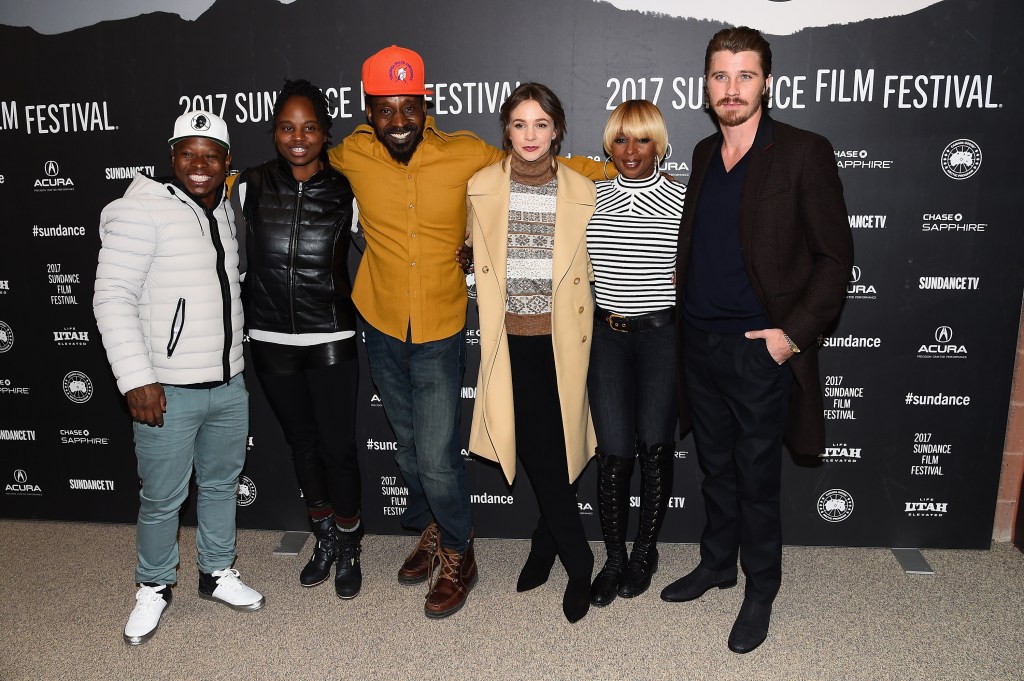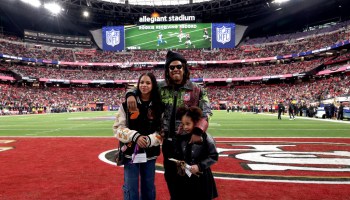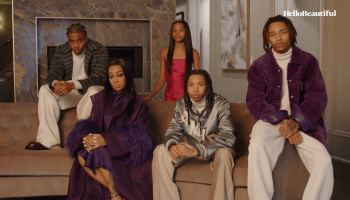
(Jason Mitchell, director Dee Rees, Rob Morgan, Carey Mulligan, Mary J. Blige and Garrett Hedlund attend the ‘Mudbound’ Premiere on day 3 of the 2017 Sundance Film Festival at Eccles Center Theatre on January 21, 2017 in Park City, Utah. Source: Nicholas Hunt / Getty)
Writer/director Dee Rees has been anything but predictable. She became a household name in 2011 with her first feature-length film Pariah, a gutting coming-of-age narrative about a young woman grappling with her sexuality. Then she turned around and took the small screen by storm with the triumphant story of iconic blues singer Bessie Smith in Bessie—which racked up more than one million viewers in its premiere. She even managed to helm a few documentary films and grace the director’s chair of the hit FOX series Empire in between projects. But even though her projects run the gamut, there is one recognizable theme that connects each of them, something we rarely see from other filmmakers. Rees boldly dismantles our most uncomfortable truths and interrogates why they remain hidden. Her latest drama, Mudbound, is no different.
Set along an indistinct American South after World War II, the movie tells the story of a black family and a white family, whose disparate vantage points illuminate a racist society that has affected them both in deeply profound ways. They’re given equal agency and layers, and are written with the same level of compassion that seeps through each of the performances. So much so that the question is no longer about who is oppressed and who is the oppressor. It presents a more complex narrative that explores the effects of war across racial lines—through these two families whose steadfast hope is destroyed once they’re shown how little their world has changed when their loved ones return from battle and are unable to navigate the harsh realities they once could.
The story opens with the McAllan family, Laura (Carey Mulligan) and Henry (Jason Clarke), a young couple who have recently arrived from Memphis with dreams of more land and a better life for his growing family. But as soon as they get there, with his spiteful father Pappy (Jonathan Banks) in tow, both husband and wife learn that they haven’t moved any further away from struggle. They have to get the house out of the clutches of the swindler they bought it from; their once promising land is actually infertile; and Laura is stuck in a house with a dutiful yet loveless man and his oppressive father. They can only anticipate that the return of Henry’s brother, Jamie (Garrett Hedlund), and the conclusion of the war, will help them realize a new reality for themselves.
Just miles down the road is the Jackson family, headed by Florence and Hap (Mary J. Blige and Rob Morgan). They’re sharecroppers on the McAllan land who become the white family’s natural default for any extra support they need—for the land or otherwise. Florence takes care of the little McAllan kids when they get whopping cough. Hap has to help out with labor on the land. And their young boys are often beckoned for additional sets of hands. But they have their own aspirations to consider, keeping a happy home in the midst of racial hierarchal, buying their own property, and paving the way for their children to have a freer life than they have. Inversely from the McAllans, their struggle is dictated by everything and everyone around them, and their home is filled with joy and the security of love. So when their oldest son Ronsel (Jason Mitchell) goes off to fight in the war, they are comforted by the hope they’ve instilled in his heart, and that he’ll come back to a more possible future for himself.
The core of the film is what happens when both men return home to a society that has remained remarkably stagnant, and try to navigate the overwhelming desire to be the face of change in a world that wants anything but. Rees, along with the heartbreaking performances of Hedlund and Mitchell, delivers a searing portrayal of post-traumatic stress in a society that failed (and still fails) to acknowledge. The sleepless nights, the alarming recognition that despite the lives they saw wasted on the battlefield—their own just merely escaping—they are still an N-word and a white drifter; a man who can’t even walk through the front door of an establishment without putting his life at risk and the other who tries to drink the memories of war out of his mind every day. Rarely in the black community do we see images of mental health, and even more rarely do we see it in male characters, who are more often portrayed like Hap—who’d rather walk around on a broken leg than have his wife take his place out in the field. It’s the film’s audacity to portray black male vulnerability especially in a historical context that admonished it which makes Mudbound that much more impactful. That and how director/co-writer Rees refuses to back down on present either family’s narrative as a deficit to the other—despite how easy it would have been to do so.
Compelling, heartbreaking, and bold, Mudbound is an absolute must-see.
DON’T MISS:
‘The Real’ Host Jeannie Mai Is Divorcing Her Husband
Mississippi School To Swap Confederate Leader’s Name For Barack Obama’s
Did Wendy Williams Fire Staff Who Leaked Cheating Rumors About Her Husband?





















